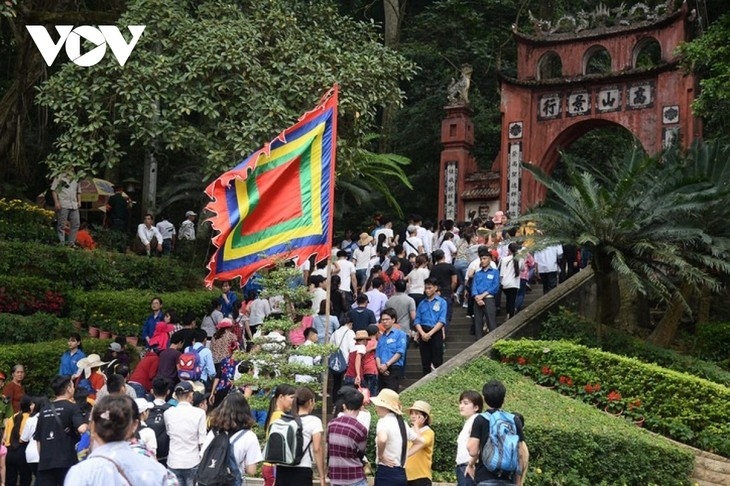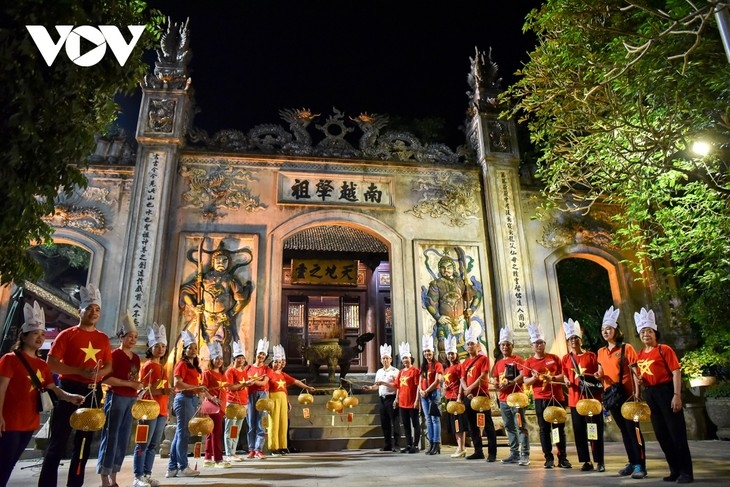Worship of the Hung Kings – the mainstay of great national unity
VOV.VN - The worship of the Hung Kings in Phu Tho province was inscribed on the Representative List of the Intangible Cultural Heritage of Humanity at a UNESCO meeting in Paris on December 6, 2012.

The ritual, which demonstrates Vietnamese people’s tradition of respecting ancestors, has gone beyond Vietnam’s borders to become a shared asset of humanity.
UNESCO’s recognition underlines the uniqueness, humanity, and universal value of the worship of the Hung Kings.
Ancestral culture and the power of great national unity
Legend has it that after taking over the throne from the last Hung King in the 3rd century B.C, Thuc Phan, who later became King An Duong Vuong, erected a stone pillar on Nghia Linh mountain in present day Phu Tho province and swore to defend the nation and take care of the Hung King Temple.
In 40 A.D, the Trung Sisters launched an uprising against the Chinese Han invaders with an oath to avenge the nation and restore the Hung Kings’ glorious legacy.
Feudal dynasties constantly encouraged people to practice the worship of the Hung Kings and issued royal decrees honoring the Hung King Temple.
Ancient historical records including “Abridged Chronicles of Dai Viet” and “Complete Annals of Dai Viet” mentioned the Hung Kings as the forefathers of Vietnamese people.
Since Vietnam regained independence in 1945, much attention has been given to the worship of the Hung Kings.
A decree on national anniversaries issued by President HCM in 1946 designated the death anniversary of the Hung Kings on the 10th day of the 3rd lunar month as a national holiday. The first Hung King Festival in independent Vietnam took place the same year.
“In 1946, President HCM chaired the commemoration of the death of the Hung Kings. Interior Minister Huynh Thuc Khang led a Government delegation to Phu Tho province to pay tribute to the Hung Kings. Offerings included a map of unified Vietnam and a sword demonstrating the resolute will to safeguard the nation,” said historian Duong Trung Quoc.
Vietnam is the only country in the world to practice ancestral worship which has been maintained for thousands of years. This invaluable heritage represents Vietnam’s ancestral culture and the power of great national unity.
“The worship of the Hung Kings meets all UNESCO criteria for a representative heritage of humanity. Vietnamese people actively engage in the practice and regard it as an inseparable part of their culture,” said Professor Nguyen Chi Ben, former director of the Vietnam National Institute of Culture and Arts Studies.

Ancestral culture preservation and development
The worship of the Hung Kings has helped popularize Vietnam’s history, culture, and traditions around the world. Preserving and promoting the ritual underscores Vietnam’s tradition of “Drink water, remember its source” and inspires the younger generation to build a powerful Vietnam.
“Phu Tho province has worked with researchers and historians to standardize the Hung King worship protocol. Consistent ritual procedures including the offerings have been applied among localities,” said Ho Dai Dung, vice chairman of the Phu Tho provincial People’s Committee.
Annually, people from across Vietnam and abroad converge at the Hung King Temple on Nghia Linh mountain at the beginning of the 3rd lunar month to commemorate their ancestors, pray for good weather, abundant harvests, good luck and good health, and tighten their bonds.
The worship of the Hung Kings has provided the mainstay of Vietnam’s great national unity and rekindled patriotism, the spirit of self-reliance, and the aspiration to build a wealthy and happy nation.
